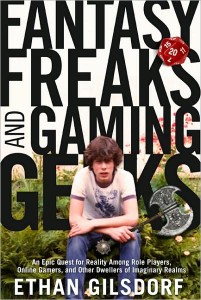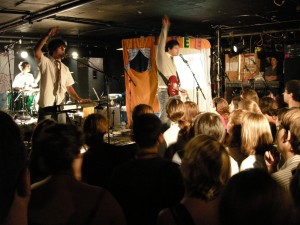Fantasy Freaks and Gaming Geeks: An Epic Quest for Reality Among Role Players, Online Gamers, and Other Dwellers of Imaginary Realms by Ethan Gilsdorf
BY SOPHIE POWELL
 Ethan Gilsdorf, a former Dungeons and Dragons addict and seasoned pop-culture and travel journalist, chronicles his international odyssey through the worlds ofHarry Potter bands, medieval reenactment societies, World of Warcraft guilds and massive fantasy conventions, to name only a few. In the process he learns to come to terms with his own attachment to the imaginary that has persisted into his forties. As a dedicated fairytale and myth fanatic myself, my curiosity was piqued by the title of the book which is at once a memoir, an insider’s guide to the world of gaming, and a quest that takes him all around the world to find answers not only to his own life, but to the larger question of why tens of millions of people turn away from reality and fully embrace fantastical other-existences.
Ethan Gilsdorf, a former Dungeons and Dragons addict and seasoned pop-culture and travel journalist, chronicles his international odyssey through the worlds ofHarry Potter bands, medieval reenactment societies, World of Warcraft guilds and massive fantasy conventions, to name only a few. In the process he learns to come to terms with his own attachment to the imaginary that has persisted into his forties. As a dedicated fairytale and myth fanatic myself, my curiosity was piqued by the title of the book which is at once a memoir, an insider’s guide to the world of gaming, and a quest that takes him all around the world to find answers not only to his own life, but to the larger question of why tens of millions of people turn away from reality and fully embrace fantastical other-existences.
What makes Fantasy Freaks And Gaming Geeks so arresting is not only the diverse, vibrant role-player communities which Gilsdorf introduces us to and provides insightful commentary on, but the hybrid nature of his text – both on a substantive and emotional level. Gilsdorf effortlessly bounces between fun, vivid-picture-painting journalistic narrative jam-packed with juicy facts and anecdotes of others, to deeply personal confessions about his own real life. The book opens with a heart-breaking scene from his early childhood in the aftermath of his mother’s brain aneurysm that completely altered her personality. This sudden and tragic metamorphosis, which left Gilsdorf and his two siblings to fend for themselves, is presented as the impetus for his retreat into Dungeons and Dragons and Tolkien, and a predilection for fantastical worlds that he is unable to shake off, even, to his anxiety, at forty.

Harry and the Potters / copyright: Ethan Gilsdorf
Indeed, most of the individuals whom Gilsdorf interviews and befriends express how fantasy, particularly fantasy role-playing, has empowered them in some way – to find a release in hard times, to learn lessons/skills that have enabled them to lead a richer real life. The way we really get to know so many of these individuals whom so many (including myself) had previously written off as weirdo geeks, forces a reassessment of our prejudices. There is Phyllis Priestly, who holds a PhD in Greek mythology and founded a primary school; she compared playing World of Warcraft to “breathing for the first time”. As Gilsdorf summarizes it, “After countless hours of playing, Priestly felt she had become a better person. The game leaked into her real world. All that rapid-fire picking off of wolves, quilboars, and troggs had sharpened her reflexes, quickened her reaction time, and heightened her senses. She claimed gaming had made her a better driver.” And, most movingly, there is Nissa Ludwig, a church music director who suffered from a debilitating muscular disorder that kept her at home most of the day. “The muscles in my body are slowly rotting,” she said, “but I type really well.” As Gilsdorf writes, “Online gaming created an alternate world where no one saw her crutches or wheelchair. And that was, in her words, ‘a beautiful thing.’”
Through Gilsdorf’s expeditions and interviews we see that there is no definitive answer to why so many of us embrace fantasy. Everyone has their different reasons, their different impulses–and even if for some, it is just straightforward escapist entertainment, we should certainly not dismiss all fantasy and gaming enthusiasts as geeks or freaks. As with most things, there are no simple, straight-forward answers, but by examining this genre more carefully (with open minds), our reading lives can only be richer and our journeys, if not always entirely successful, at least more fantastic.
No comments:
Post a Comment